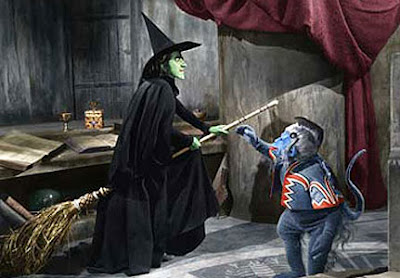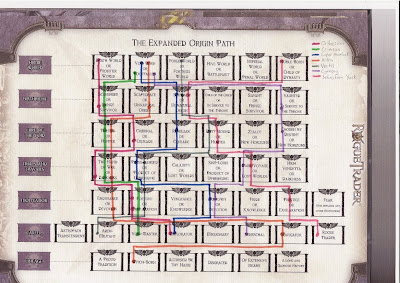(I have not included familiar Old School vs. New School differences like Theme Vs. Randomness because everybody grown-up should already be used to that shit and be able to spot differences like that from miles away and not get into it.)
Like any typology of philosophical differences, the point of enumerating these differences is mostly to enable people to notice when a back-and-forth they are having is just one of these larger differences being pointed up and so to allow folks to not waste time arguing about them and just go You are this kind of person & I'm that kind of person and oh, I see...
Vinyl Experts Vs. Garage Rockers
Vinyl Experts really like and--perhaps more to the point--know a lot about various TSR products and other early game products. Garage Rockers see the simplicity of the early games as a nice, solid, three-chord chassis to build their hot rod on but have less specific attachment to the Word of Gary. Experts are more often into nostalgia, TSR-product exegesis, and combing message boards (also see Arcanists, below) and Garage Rockers often find themselves disagreeing with TSR as often as they agree with it and are more often into bringing non-RPG knowledge to the table. I'm definitely in the garage. James Mal is a Vinyl Expert. Jeff of the Gameblog seems like pretty much both.
The Integrity of the World/Campaign Is A Priority vs. The Social Thing Is The Major Priority:
Check out these two answers from the Beyond The Black Gate interview by Raggi and Me, respectively:
BTBG: Gygax said "The essence of a role-playing game is that it is a group, cooperative experience". How important to do you think this is, and why?
Raggi: For me that’s not the most enjoyable part, but it is the payoff and the justification for the parts I most enjoy. The best part is the creation of a world or adventure location, putting it together and making it work so that it feels like an actual place. The RPG context sets a boundary, and I find such parameters helps me be coherently creative. But all that is useless without real people to make use of it, to muck around, and to see if it breaks, and to see if they enjoy the process.
(Same question--these were emailed to us so we didn't see each others' responses.)
Zak: That's the most important thing, to me. A lot of people rattle on about the integrity of the Game or the World or the whatever, but if I just want to be a creative little snowflake--well, I'm a painter, I get enough of that at work. For me, D&D is like a party, and the DM is throwing it, and all the arts and crafts are wasted if it's no fun and everybody isn't better friends afterward.
I noticed this difference when I was helping Raggi edit LOTFP: Weird Fantasy--he made references to how over time you'd learn how the game works and thereby "improve" your game. Whereas my take is and has always been: if everybody shows up, has fun, and immediately wants to play again over and over forever, they could do everything "wrong" and the game would still be "good". The challenge for me is finding new kinds of fun every week, not upping the technical ante.
I do not want to argue who is right here, that would be boring and dumb--and you are boring and dumb if you do that in the comments. Obviously everybody who has a group who keeps coming back week after week has all the constituency for their DM style they need. Plus I've played with James DMing and played his modules and had fun and I like him and we get along and I don't consider him some morphodite loser and so obviously none of these differences will kill anybody's game. I just want to point out the different philosophies and some hallmarks of them. Here are some differences in opinion stemming form these differences in assumption--"integrity" position goes first and the "social" position is second (and please realize that, being an advocate of approach #2 I may have unfairly characterized the other guy but am trying not to, if you are an Integritist and would like to submit an adjustment, be my guest ):
-Greater willingness to let a part of the game be "boring" for some greater end down the line ("Integritist") vs. lesser willingness to let a part of the game be "boring" for some greater end down the line ("Socialist")
-Desire to find players who match the DM's preferred style vs. desire to tune the DMing style to match the players you want to play with or are playing with
-Impatience with their players not having their shit together vs. detached amusement with the players not having their shit together
(Addendum: I didn't mean "having their shit together" as in not panicking when they see monsters, I meant as in showing up with their own dice and a pencil and on time.)
-Emphasis on the world or campaign as an important creative act vs. indifference to campaign or world features unless they translate into gains a the table
People Who Look Real Closely At The Differences Between Holmes & Moldvay And Shit Like That (or Rules Arcanists) Vs. People Who Don't (Scramblers)
Looking over the Wiki, I've noticed there are some people who have written interesting stuff that I've used who aren't on my blog list. The reason they aren't is because they are Arcanists and so like nine posts out of their ten I just glaze over--not because they're bad but just because they fall outside my area of D&D interest. About half of the DIY D&D people like looking through the old rulebooks and figuring out how to make them work and about half just sort of are trying to scramble around and make the game they happen to be running at the moment run smoothly by whatever means necessary. I'm definitely a Scrambler but I think of Arcanists kinda like I think about astrophysicists--I am happy to listen when they come up with something cool, but I lack the knowhow and patience to make watching them try to figure it out fun for me. My primary interests lie elsewhere.
Like the d6-for-all-weapons-or-not? damage rule might interest me more if I was about to start a new campaign with people who've never played or who had played so much they were kinda let's-try-whatever about the rules, but my players aren't going anywhere and we have been playing one campaign for a few years and they came to play this game with weapons working like this so that's what's happening and so that's what I'm worried about.
My feeling about the Arcanists is they tend to be people who have played a lot of D&D systems and who run games with strangers a lot. So they are starting new games all the time or have spent a lot of time comparing how X campaign came out compared to how Y campaign came out.
People Who Are Worried About WOTC Vs. People Who Aren't
Although I'm pretty much in category 2, I can see the POV of the WOTC watchers very clearly: Whatever the current edition of D&D is, that's the gateway drug for a lot of new players. This is where a large potential pool of new players comes from. So if WOTC trains these new players to want shit that DIY D&Ders can't provide or weeds out people who might otherwise want what DIY D&D can provide then it shrinks the potential group of people who might play with you. Plus talking about what you think WOTC is doing "wrong" often points up things you like about your way of rolling. Plus a lot of bloggers have been playing D&D regularly for decades or more and following the TSR and WOTC releases as they came out and so have watched the game slowly move out of their own personal sweet spot and so have a sort of emotional history with the D&D industry.
Since none of my players except Satine began with WOTC D&D and because I have a steady group full of players I like--and because I suspect, running in the circles I do, most future players I have would tend to be people with no RPG experience or with TSR-era experience--I don't think about this much. But if you do, ok, fine.
Provocateurs Vs. Straight Shooters
First, Provocateurs aren't Trolls--Trolls think electronic communication with strangers is, in itself, a marvelous and perhaps unparalleled entertainment and are willing to say shit just to hear what the internet says back, no matter how actually inaccurate or dumb what they have to say to get that reaction is--Provocateurs believe that only by saying inaccurate, dumb shit can they get people to pay attention to actual points they're trying to make. Straight shooters, on the other hand, try to say exactly what they believe to be true no matter how dull it is.
There is, of course, no point in telling Trolls to stop arguing with anyone-they have enough spare time to consider internet arguing a hobby in itself and do not do it out of curiosity about the underlying differences in assumption that lead to differences of opinion or out of a desire to destroy error--so this is only a message to Provocateurs and Straight Shooters: Realize when you are dealing with each other--you can use this...
 (which was dug up by Jeff on twitter)
(which was dug up by Jeff on twitter)...and realize that in order to successfully make your point you will -have- to know which kind of person you are dealing with.
Provocateurs tend to see complacency about the state of RPGs as a mortal sin and straight shooters tend to see inaccuracy about the state of RPGs as a mortal sin. Therefore they can easily offend each other without knowing why. Long-time readers will note I am a hair-trigger straight shooter and will strike down inaccuracy with great force and furious vengeance around these parts--RPGPundit is a Provocateur. Both of us, I'm sure, believe our positions to be the only responsible ones in these troubled times.
Note also that there are Straight Shooters whose opinions are unpopular enough that they can be mistaken for Provocateurs by those with limited experience of the world. Like I used the word "fuck" once in a press release on account of that's just how I talk and I didn't even realize it was in there but some people thought it was part of some calculated strategy to enrage role-playing game enthusiasts on the internet.
Also, as a sidebar, there are Rubberneckers--a subclass of both Trolls & Lurkers who see watching other people arguing about things they themselves don't care about (or are immune to persuasion about) via electronic media as a fun way to spend their spare time and who will point to internet fights and go "oh that was great, I loved that one, I laughed my ass off", and there are--on the other hand--people who think that their own personal existence has managed to have gotten itself organized in such a way that they have more fun ways to pass their limited span on this mortal coil. Again, I pass no moral judgments here, but I do feel a responsibility to point out, for the benefit of all, that such differences in the essential nature of the Lord's creatures exist.
Expressionists Vs. Utilitarians
Expressionists write things because they think them. Utilitarians write them because they perceive some game-related end will be served by writing that belief down. Again: each should know when they are dealing with the other, it will save time.






































